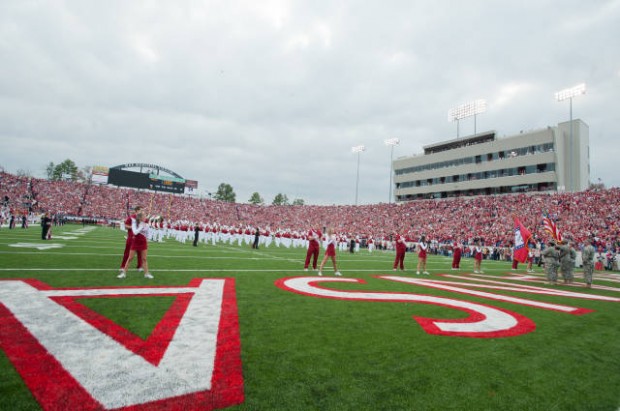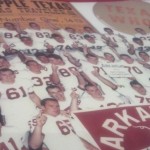More than once in recent weeks, University of Arkansas head football coach Bret Bielema has said it: He doesn’t consider Razorback games in Little Rock to be home games.
Bielema has made very few wrong moves since taking the Arkansas job last December. He has given dozens of speeches across the state and gotten to know many of the football team’s most ardent supporters. Razorback fans, hungry for any sign of progress following last year’s Bobby Petrino meltdown and John L. Smith disaster, have been charmed by the man. His comments about Little Rock games, however, have upset some of those who follow the program in central, south and east Arkansas.
I like most of what I have seen from Bielema so far, both as an individual and as a coach. He’s personable, unlike the dour Petrino who rated a negative two on the personality scale. He seems to have a good relationship with his assistants and players. Again, this is in contrast to Petrino, who ruled by fear.
As a small-town boy who was raised on a farm in Illinois, Bielema has been able to relate to the people of this largely rural state in most instances until now.
In an interview several years ago, Steve Stefani, Bielema’s fifth-grade teacher and his coach in the seventh and eighth grades at Prophetstown, Ill., said: “The other kids always looked up to Bret and followed his lead. Bret was very athletic, and football almost seemed to come naturally to him. He was our quarterback and he always wanted to play defense. … In those years, you only had one boy who could run the team well, and Bret did a heck of a job running the team.
He has been a leader ever since – as a player at the University of Iowa, as an assistant coach and as a head coach.
So I’m willing to give Bret Bielema the benefit of the doubt, as much as I love the tradition of Little Rock games. I know what he’s trying to say: There’s a trip involved, and the players aren’t sleeping in their own beds the night before a game.
He must also realize that unique traditions are what set certain football programs apart. The Hog call, for instance, makes Arkansas unique (there should be more of them rather than trying to force feed new things to fans). Playing multiple home games away from campus also makes Arkansas unique. Those things should be considered strengths rather than weaknesses, as difficult as they are to understand right now for a man who has found himself in quirky Arkansas for only nine months after having spent most of his life in the Midwest. For decades, Arkansas was the only non-Texas school in the Southwest Conference. We know “different.” We embrace “different.”
As I tried to make clear in a newspaper column last week, this has never been an easy state to explain to outsiders. I occasionally accepted lunch and dinner invitations from visiting reporters who came to Little Rock during Bill Clinton’s 1992 presidential campaign, but I failed miserably during those meals when it came to summing up Arkansas for them. They just didn’t get us. It wasn’t his intent, but Bielema’s comments set off the Great Stadium Debate again, even though the current contract doesn’t end until the conclusion of the 2016 season.
By this week, both Bielema and athletic director Jeff Long were attempting to soften the tone.
“We love playing in Little Rock,” Long said. “You can’t deny that there is a financial piece to this and there is a travel piece to it, but those facts have been around for a long time.”
Bielema said: “I am excited because I love to embrace things that I have never done before. … I am excited to see the experience and the atmosphere.”
Before Saturday night’s game against Samford, let’s clear up three fallacies that you’re going to hear a lot between now and 2016:
Fallacy No. 1: Long and Bielema have already made up their minds to move the two Little Rock games to Fayetteville when the current contract ends – That’s not the case. And even if they do make up their minds, there’s a problem. They won’t be the ones making the decision. This goes so much deeper than what the fans like to refer to as “The Program.” Razorback football has become such a part of this state’s fabric that the choice has to do with more than sports revenue. If it were all about revenue, all home games would have been moved to Fayetteville 13 years ago. The decision at the end of 2016 will be made by the gubernatorial appointees on the University of Arkansas board of trustees, not by coaches or administrators. I have great respect for Long, and so do the trustees. They will give serious consideration to his recommendation. But just as was the case in early 2000, they will have to consider the effect the decision has on the entire University of Arkansas System, not just “The Program.”
I was working in the governor’s office at the time and was in the room when Gov. Mike Huckabee made the decision to take the Little Rock side in the original Great Stadium Debate. The Board of Trustees initially deadlocked 5-5 on a proposal to give Little Rock three games in nine of the next 15 years and two games in each of the other six years. A vote that Huckabee was counting on to go Little Rock’s way went the other direction at the last minute, resulting in the tie. It was such a big issue that the Little Rock television stations carried the next board meeting live from a Little Rock hotel ballroom. On the morning of Feb. 11, 2000, the board voted to give Little Rock just two games in 11 of the next 15 seasons. With plenty of statewide political and economic concerns to take into consideration, I would expect the board to leave some Little Rock games on the schedule the next time around.
Fallacy No. 2: The university can no longer afford to play Little Rock games – The launch of the SEC Network on cable television next year will provide a windfall for all 14 SEC members. If anything, the additional money that comes in will allow the university the luxury, if you will, of keeping the Little Rock tradition alive if indeed members of the Board of Trustees determine that’s in the best interest of the entire system. With television revenues producing a larger percentage of the athletic budget, actual per-game revenue (while still important) isn’t as big a piece of the pie as it once was.
The figures you often hear tossed around as far as the revenue differences between War Memorial Stadium and Razorback Stadium are based on sellouts. The problem with using those figures is that there likely will always be contests on the 12-game schedule that won’t produce sellouts. Frankly, it looks better to have 53,000 people in a 54,000-seat stadium than 53,000 people in a 72,000-seat stadium.
Some have said that plans to potentially expand Razorback Stadium are a death knell for games at War Memorial. Yet Arkansas couldn’t even sell all of the current 72,000 seats for the season opener and the debut of a new coach, for gosh sakes. Trustees will have to take a long, hard look at that fact before agreeing to further expansions. Here’s the brutal fact: There’s a ceiling that’s reached in both attendance and the amount of money people are willing to pay in a state of fewer than 3 million people with a low per-capita income. We may be near that ceiling. I could see all SEC games eventually moving to Fayetteville, but there likely will always be nonconference contests that are a better fit for Little Rock, at least in the minds of a majority of trustees.
Fallacy No. 3: The city of Little Rock should do more to maintain War Memorial Stadium — It’s amazing how many otherwise educated people I run into who think War Memorial is owned by the city of Little Rock. If it had been owned by the city of Little Rock, I contend the stadium already would have been sold to UAMS for a parking lot, the fate of grand ol’ Ray Winder Field. War Memorial Stadium is a state facility. And former War Memorial Stadium Commission chairman Gary Smith and current commission chairman Kevin Crass have done an excellent job of improving the facility. The new press box (and the revenue-producing two levels of private seats and suites) are first class all the way. The old stadium has never looked better. Will the Legislature come through with a huge appropriation for an expansion? I doubt it. Given the above facts, though, that doesn’t mean Little Rock is out of the mix at the end of 2016.
Do you play Alabama there every other year? No.
Do you continue the important Arkansas tradition of playing some other games there? Why not?
As noted, there’s something to be said for being unique.














